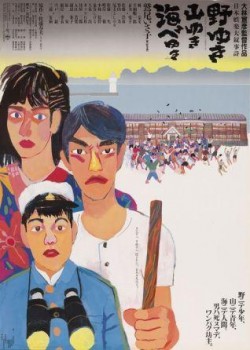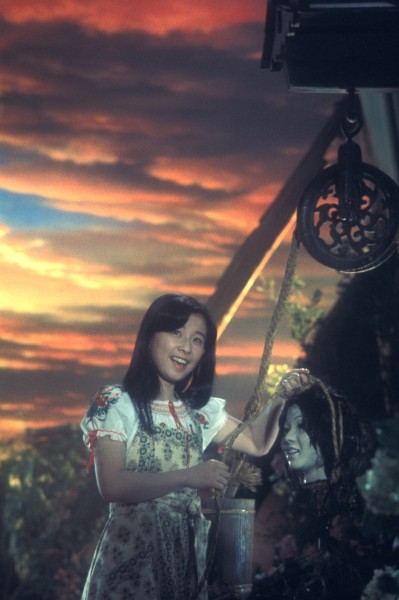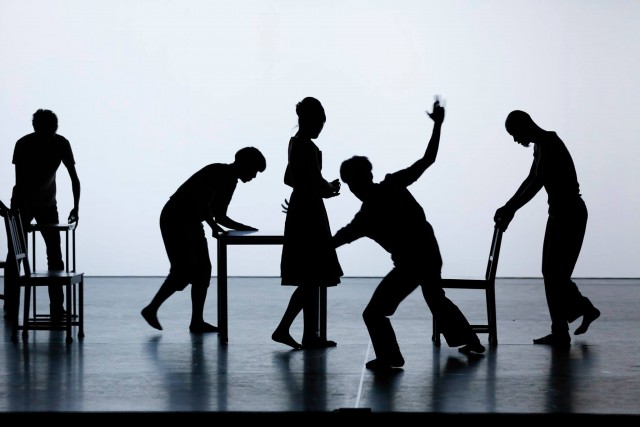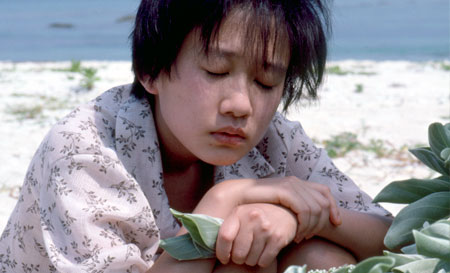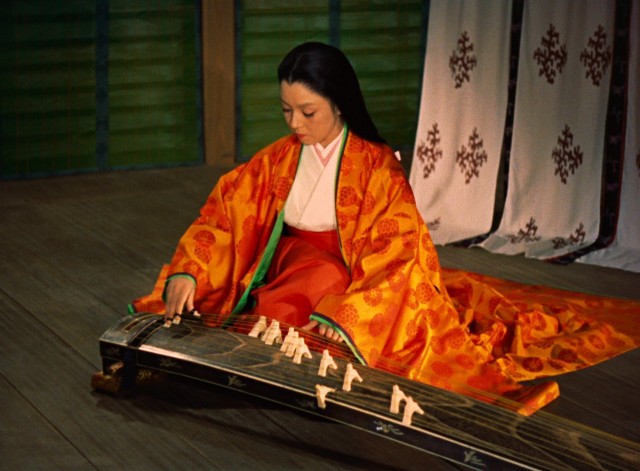
Machiko Kyō stars as a married woman being chased by an obsessed samurai in Teinosuke Kinugasa’s GATE OF HELL
GATE OF HELL (地獄門) (JIGOKUMON) (Teinosuke Kinugasa, 1953)
Japan Society
333 East 47th St. at First Ave.
Friday, January 8, $12, 7:00
212-715-1258
www.japansociety.org
 Japan Society’s January edition of its Monthly Classics series harkens back to its past with Teinosuke Kinugasa’s lush, vibrant jidaigeki film, Gate of Hell; the society sponsored the movie’s U.S. premiere at the Guild Theatre in December 1954, the first Japanese color film ever to be shown in America. Set during the twelfth-century Heiji Rebellion, the samurai drama, based on a play by Kan Kikuchi, focuses on Morito Endo’s (Kazuo Hasegawa) dark, absurd obsession with Lady Kesa (Machiko Kyō), a married woman who is very much in love with her husband, Wataru Watanabe (Isao Yamagata). After protecting Lady Kesa and helping defend his lord, Morito is offered whatever he wants by Kiyomori the Monk (Koreya Senda). The court laughs at Morito when he asks for Lady Kesa’s hand in marriage, but when Kiyomori decides to humor him, Morito opts to pursue his goal, no matter the cost, or the humiliation.
Japan Society’s January edition of its Monthly Classics series harkens back to its past with Teinosuke Kinugasa’s lush, vibrant jidaigeki film, Gate of Hell; the society sponsored the movie’s U.S. premiere at the Guild Theatre in December 1954, the first Japanese color film ever to be shown in America. Set during the twelfth-century Heiji Rebellion, the samurai drama, based on a play by Kan Kikuchi, focuses on Morito Endo’s (Kazuo Hasegawa) dark, absurd obsession with Lady Kesa (Machiko Kyō), a married woman who is very much in love with her husband, Wataru Watanabe (Isao Yamagata). After protecting Lady Kesa and helping defend his lord, Morito is offered whatever he wants by Kiyomori the Monk (Koreya Senda). The court laughs at Morito when he asks for Lady Kesa’s hand in marriage, but when Kiyomori decides to humor him, Morito opts to pursue his goal, no matter the cost, or the humiliation.
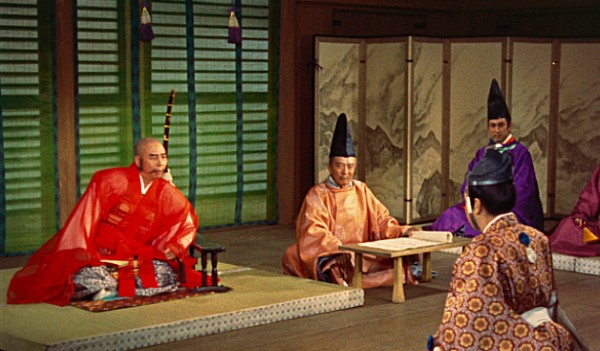
Teinosuke Kinugasa’s award-winning GATE OF HELL is filled with lush colors and beautiful cinematography
Gate of Hell, which won the Grand Prix at the 1954 Cannes Film Festival and Best Costume Design (Sanzo Wada) and a special Honorary Foreign Language Film Award at the 1955 Oscars, was beautifully restored a few years ago, its dazzling colors now jumping off the screen in a barrage of eye-catching orange, turquoise, purples, greens, and reds. Kōhei Sugiyama’s breathtaking cinematography spectacularly captures Wada’s gorgeous costumes and both the indoor and outdoor sets, the deep, detailed compositions giving the film a rousing 3D feel, from a single red flower in a green field to two rows of men lined up in a room to a battle scene in the woods. The leads will be very familiar to Japanese film fans; Hasegawa appeared in nearly three hundred movies, including Kenji Mizoguchi’s The Crucified Lovers and Kinugasa’s Jujiro and Tsukigata Hanpeita, among others, while Kyō starred in Akira Kurosawa’s Rashomon, Mizoguchi’s Ugetsu and Street of Shame, Yasujirō Ozu’s Floating Weeds, and Hiroshi Teshigahara’s The Face of Another. The Monthly Classics series continues on February 5 with Kihachi Okamoto’s The Sword of Doom.
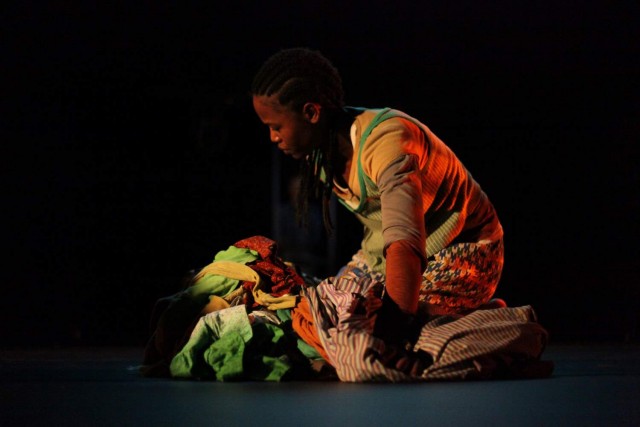
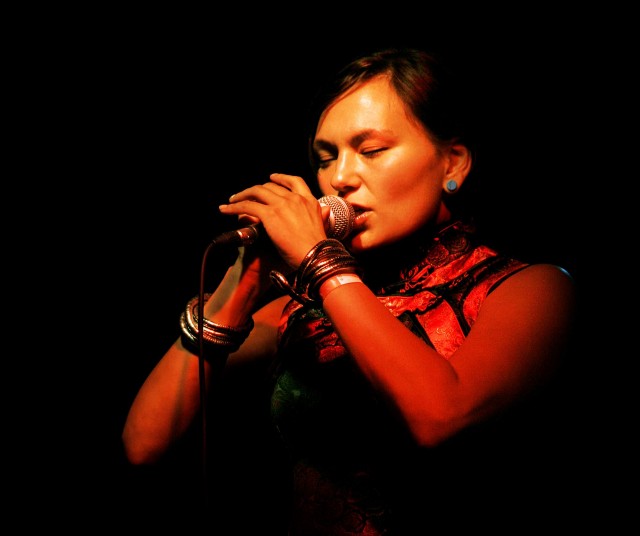
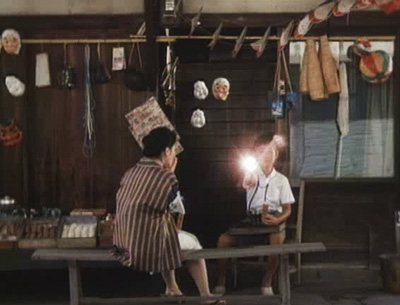
 Over the opening credits of Nobuhiko Obayashi’s Bound for the Fields, the Mountains, and the Seacoast, the sweet sound of children singing can be heard over machine-gun blasts and explosions, immediately setting the tone for this unusual, highly stylized war-set drama. “It was a time of mischief in Japan. Even in wartime,” it says at the end of the black-and-white credits, before cutting to a shot of the red-and-white Japanese flag blowing in the wind. Kids slowly march to school to the beating of a drum, except for Sotaro Sudo (Yasufumi Hayashi), who skips down narrow streets by himself, wearing a pseudo-military outfit and carrying a pair of binoculars to help him spy on what’s going on. When he spots someone in the teacher’s (Jô Shishido) office who he’s never seen before, he wonders to himself, “She looks too young to be an adult, but too old to be a child.” That sets the stage for the rest of the film, in which Obayashi follows a group of boys and girls as they battle among themselves, experience bullying and budding sexuality, and grow up a little too fast, serving as a microcosm of twentieth-century Japan. “It is clear that reality and lies can divide people. We should not quarrel too hastily,” the teacher says. Sotaru becomes enamored with the young woman, Kawakita (Riki Takeuchi), whose younger brother, Sakae Osugi (Junichirô Katagiri), is new in school. “Please don’t be violent,” Kawakita tells Sakae, but it isn’t long before he may not have any other choice, especially when their parents (Taru Minegishi and Toshie Negishi) consider selling her into prostitution to pay off their mounting debts.
Over the opening credits of Nobuhiko Obayashi’s Bound for the Fields, the Mountains, and the Seacoast, the sweet sound of children singing can be heard over machine-gun blasts and explosions, immediately setting the tone for this unusual, highly stylized war-set drama. “It was a time of mischief in Japan. Even in wartime,” it says at the end of the black-and-white credits, before cutting to a shot of the red-and-white Japanese flag blowing in the wind. Kids slowly march to school to the beating of a drum, except for Sotaro Sudo (Yasufumi Hayashi), who skips down narrow streets by himself, wearing a pseudo-military outfit and carrying a pair of binoculars to help him spy on what’s going on. When he spots someone in the teacher’s (Jô Shishido) office who he’s never seen before, he wonders to himself, “She looks too young to be an adult, but too old to be a child.” That sets the stage for the rest of the film, in which Obayashi follows a group of boys and girls as they battle among themselves, experience bullying and budding sexuality, and grow up a little too fast, serving as a microcosm of twentieth-century Japan. “It is clear that reality and lies can divide people. We should not quarrel too hastily,” the teacher says. Sotaru becomes enamored with the young woman, Kawakita (Riki Takeuchi), whose younger brother, Sakae Osugi (Junichirô Katagiri), is new in school. “Please don’t be violent,” Kawakita tells Sakae, but it isn’t long before he may not have any other choice, especially when their parents (Taru Minegishi and Toshie Negishi) consider selling her into prostitution to pay off their mounting debts.